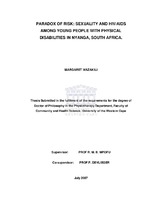| dc.description.abstract | The current study aimed to describe the paradox of risk through an
exploration of the experiences and perceptions of sexuality and HIV/AIDS
among physically disabled young people in Nyanga, South Africa. This is
against the background that AIDS has become a national and global crisis,
which requires all people to participate in efforts to contain the pandemic. Yet
literature indicates that young people with disabilities are not participating in
such efforts. There is also an assumption, that physically disabled young
people do not experience challenges in expressing their sexuality and
accessing HIV/AIDS prevention services, to the same extent as other
disability groups such as the blind and those with intellectual disabilities.
Hence there was a need to explore disabled young people’s own
understanding of risk and the factors that hinder or support their participation
in existing sexuality education and HIV/AIDS prevention programmes. It was
also important for this group to suggest ways in which they may participate in
such programmes.
A qualitative case study design was chosen as the appropriate means for
achieving the aim of the current study. This design allowed me to study
disabled young people without separating them from their context. In this way,
a comprehensive understanding of this group was realised. Multiple methods
of data collection from multiple data sources were employed, a feature that
helped to discuss the ‘case of disabled young people’ in-depth and breadth.
Policy and programme documents and relevant literature were reviewed for
relevant information on sexuality education and HIV/AIDS prevention services
for disabled young people. Fifteen disabled young people between the ages
of 15 and 24 participated in individual in-depth interviews and in focus group
discussions. Pertinent issues that arose from individual interviews were
discussed with 15 parents, 15 senior citizens, five sangomas and five
counsellors in focus group discussions of 4-10 members each. Similar issues
from focus group discussions were taken up with eight key informants in more
individual in-depth interviews for confirmation and clarity.
Textual and contextual features of the Atlas.ti computer programme for
analysing qualitative data were used to organize and analyse data. The
textual features were used to code data and write memos, while the
contextual features were used to link the codes and to form networks from
which categories and themes were generated. Themes and sub themes were
used to answer the research questions and meet the objectives of the study.
The study has revealed a complex interplay of contextual and individual
factors that combine to create situations of risk for disabled young people.
These factors affect disabled young people’s experiences of growing up and
participation in existing sexuality education and HIV/AIDS prevention
programmes. Contextual factors include cultural beliefs and poverty, while
individual factors include sexual behaviour and attitude towards HIV risk. I
found that disabled young people have limited access to education and other
social amenities, which in turn affect their experiences of life in general and
sexuality and HIV/AIDS.
The study has revealed that the paradox of risk lies in the contradictory scripts
and attitude towards the pandemic at contextual and individual levels. The
belief that disabled young people are asexual is common in Nyanga, yet
society targets this group for sexual exploitation and rape. In the face of an
epidemic that has crippled the fabric of society, and in spite of the widespread
availability of HIV/AIDS awareness programmes, most disabled young people
still do not have accurate factual knowledge about HIV/AIDS. Yet accurate
information is one of the prerequisites for making informed decisions about
HIV/AIDS prevention.
Furthermore, gender differences make the experiences described above more
serious for disabled young women who suffer discrimination and sexual abuse
even from fellow disabled young men. Although most disabled young people
indicated that they are aware of the gravity of the pandemic and that they
personally feel threatened, they are not taking preventive measures against
contracting the infection; they have adopted a fatalistic response to risk.
Participants argue that in the same way they are not able to protect
themselves from going hungry, or living in shacks, they also cannot prevent
getting infected with HIV, which they equate to any accident over which they
have no control.
Disabled young people expressed the need to participate in mainstream
education systems, sexuality education and HIV/AIDS prevention
programmes. They also pointed out that there will always be disabled young
people who require separate programmes because of special disability
circumstances such as inability to travel to clinics/centres.
In order to meet disabled young people’s expressed wishes, I have
recommended in this thesis, a community-based sexuality education and
HIV/AIDS prevention programme that focuses on the whole community
instead of individuals only so as to deal with contextual and individual factors
of risk. Such a programme encourages dialogue and participation as opposed
to the information giving approaches from experts. A guideline that existing
HIV/AIDS intervention programmes can use to include disabled young
people’s special circumstances, has been presented. | |

